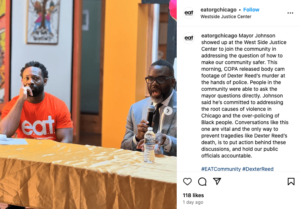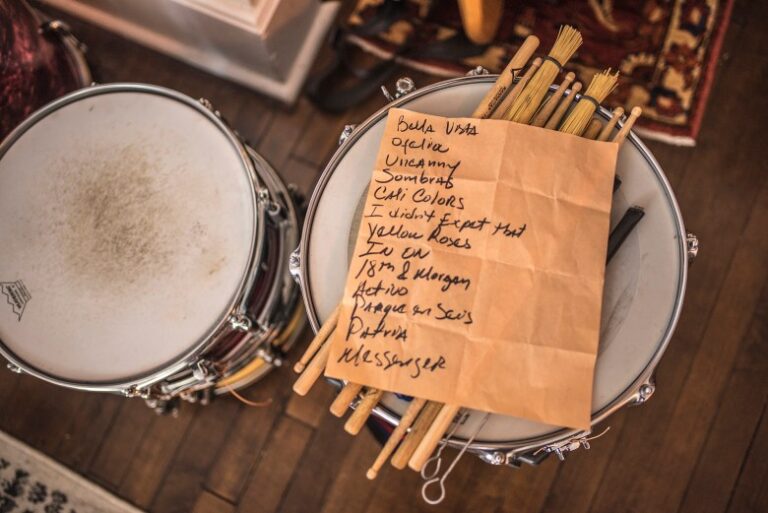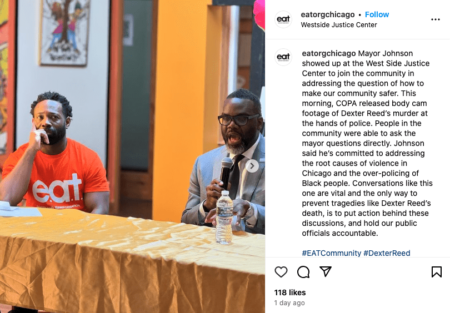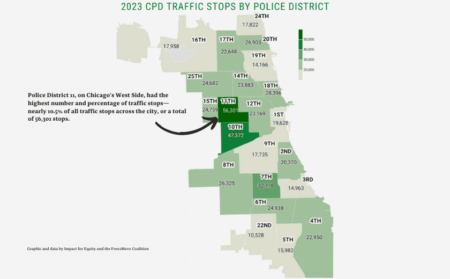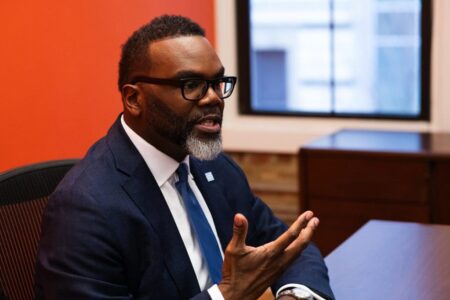Chicago-based percussionist Daniel Villarreal says his debut solo album, Panamá 77, is a soundtrack of his life and an introduction to who he is. “It’s about my upbringing and my experiences as a musician and artist in the city of Panamá and also in the city of Chicago,” he explains. “It’s a blend of all that, a mix of different experiences that I want to introduce to people sonically.”
Panamá 77 came out in May via Chicago-based International Anthem, and its 12 tracks fit smoothly into the label’s top-shelf catalog of intoxicating hybrid grooves. They fuse experimental psychedelic funk with jazz, rock, and reggae, plus traditional Latin rhythms such as cumbia and son jarocho, the distinctive tones of vintage keyboards (Farfisa, Rhodes piano, Mellotron, Hammond organ), the occasional synthesizer, and more.
“Panamá 77 states where I am as an artist too, and where I stand at the moment. That’s why I put a title of something close to me, my homeland, my city of Panamá. And ’77 is the year I was born,” says Villarreal. “My main goal is putting good stuff out there and representing my race, my ethnicity, who I am, and keeping true to myself. That’s also important. You can’t lose your identity in whatever you do. Everyone has their own charm and magic.”
Daniel Villarreal, Anteloper, Jeremiah Chiu & Marta Sofia Honer
Fri 7/8, 8:30 PM, Thalia Hall, 1807 S. Allport, $20, 17+
Villarreal’s own charm and magic come through in the music he creates, in his DJ sets across Chicago (he sometimes spins as “Brown Baby Jesus”), and in the confident way he carries himself, with a fashion sense that’s always on point. He adorns his fingers with bold statement rings that gleam and flash as he drums, and his retro outfits seem to pay tribute to the cool, carefree styles of the 60s and 70s. As flamboyant as Villarreal can be, though, he’s not full of himself—his approach to life exudes humility. His courteousness, his constant smile, and his laid-back personality make him easy to approach.
Villarreal dedicates Panamá 77 to his paternal grandmother, Ofelia De León, known affectionately as Abuela Fella, who influenced him and inspired him with her glass-half-full outlook. He grew up with her in the town of Arraiján, just west of Panama City. He remembers his childhood fondly, despite the persistent presence of the military in the streets to suppress protests against the country’s dictator, Manuel Noriega—and despite the trauma of the U.S. invasion of Panama in 1989 that culminated in the capture of Noriega.
Villarreal laughs as he remembers the nickname he was given as soon as he was old enough to talk: because of his nonstop jibber-jabber, he was called “el polítiquero” (“the politician”). He would approach anyone of any age and start conversations that would go on and on. He was told he had an old soul.
Villarreal’s parents, who worked and lived in Panama City, would visit him at his grandmother’s home on weekends, and music became a focal point in his life after an especially memorable visit when he was five or six years old: his father, a musician in a touring conjunto, started teaching him to play the organ. Soon he switched instruments and dedicated himself to drumming, and by his teens he was deep in the local punk-rock community—he’d eventually tour with punk bands (No Hay Día, 2 Huevos 1 Camino) across Panama and Costa Rica.
It was during this time that Villarreal began to expand his musical horizons by taking lessons from acclaimed drummer Freddy Sobers, known for his work with reggaeton and dancehall legends Nando Boom and El General. Sobers taught Villarreal different styles and became his mentor, enlightening him about approaching music with an open mind.
Villarreal took his mentor’s advice, and after he relocated to Woodstock, Illinois, in the early 2000s, he began forming connections with local musicians and continued expanding into genres beyond punk and ska. In 2012, he moved to Chicago and dedicated himself to making his living as a full-time musician. In 2013 he cofounded the band Dos Santos, an experience that introduced him to playing cumbia. Since then he’s helped launch the groups Valebol and the Los Sundowns; he also plays with Mexican folk band Ida y Vuelta and Latin psych-pop artist Rudy De Anda, and he’s performed with Mucca Pazza and Wild Belle.
When Villarreal hits the road, though, it’s not always to tour: he’s a proud father to two daughters, Estelle and Fania, and he visits them often in their hometown of Ocean Beach, California. Estelle graduated from high school in 2021 and is pursuing a degree in anthropology at UC Santa Cruz, while Fania will start at the University of San Francisco this fall to study psychology and music.
The cover of Panamá 77 pictures Daniel Villarreal in a studio in the backyard of International Anthem cofounder Scotty McNiece.
Text on the obi strip wrapped around the LP sleeve of Panamá 77 calls the album a “Floral array of percussive psychedelic funk blossoms foraged from an abundant garden of communal instrumentals.” The sessions were definitely communal—each track has its own lineup supporting Villarreal, drawn from a pool of a dozen musicians that includes the likes of Jeff Parker (Tortoise), Elliot Bergman (Wild Belle, Nomo), Cole DeGenova (Lupe Fiasco, Chance the Rapper), Bardo Martinez (Chicano Batman), and Nathan Karagianis (Dos Santos, Careful Giants).
Villarreal adds facets to his music with more than just a variety of personnel, though: he’s carefully crafted compositions that explore traditional sounds in nontraditional ways. Some of these sounds are influenced by his roots in Panama City, others by his experiences in the midwest—it wasn’t till he moved to the States, for instance, that he was exposed to son jarocho, chicha, cumbia, jazz, soul, and house.
The album isn’t a faithful representation of Panamanian or Latin American music, and Villarreal doesn’t pretend it is. “Tradition is a point of reference, not a destination,” he explains. “I use traditional influences in my songs—folkloric, or of any traditional genre. It can be jazz or rock or whatever. But I am experimenting with all these sounds—that’s why it may sound familiar, but it’s only a point of reference.”
The song “Ofelia,” for example, gestures at son jarocho (a folk style from Veracruz) with its percussion, even though traditional son jarocho uses no drums. The rhythm that opens the song and provides its pulse—which Villarreal demonstrates by repeating the words “café con pan, café con pan, café con pan”—is foundational to this familiar style.
On the other hand, the track “Patria” is Villarreal’s interpretation of an old standard by Panamanian composer and organist Avelino Muñoz. He sticks close to the original, and he says he recorded it as a tribute to Muñoz and to his own organist father.
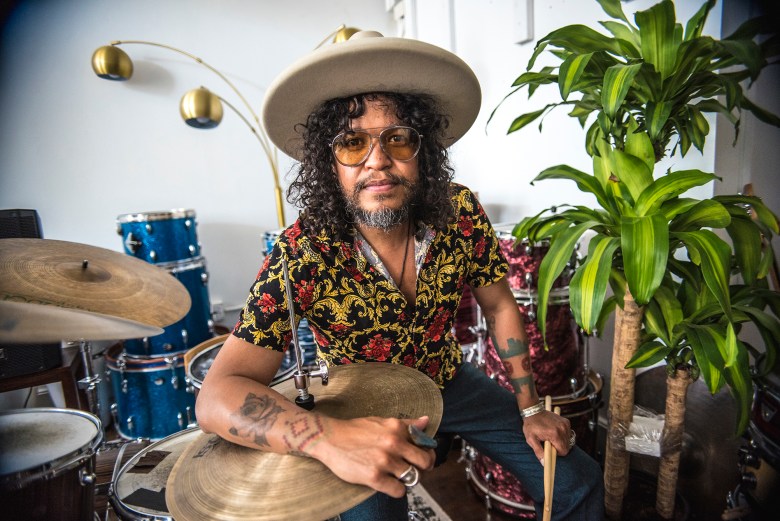
“Growing up, my father, who is an organ player, would listen to a lot of organ music and asked me to listen along,” Villarreal says. “My dad took lessons from Avelino Muñoz’s sister. The Muñoz family, a big family, taught music privately. They would teach anyone to play piano, compose, play guitar, or sing. My dad took lessons with them and exposed me to this traditional Panamanian organ music, so I grew up listening to it and would also hear it on the radio and on television before the day’s news started. ‘Patria’ translates to the homeland, and I just wanted to pay tribute to Avelino.”
Recording sessions for Panamá 77 began in 2019 and continued into the pandemic. Scottie McNiece, cofounder of International Anthem, used the backyard of his home to set up an outdoor studio for Villarreal. You can see him in that studio with his drums on the cover of the album.
The track “I Didn’t Expect That” got its title from a jam session at McNiece’s with guitarist Jeff Parker. It was an interesting take all around, Villarreal says, because he didn’t know where it would go.
“You know, it’s October of 2020, and people are still on edge because of the pandemic, but we agreed to gather outside,” he explains. “And this was the first time since the pandemic began that Jeff Parker left his house, ever. And when the song ends he says, ‘I didn’t expect that,’ and laughs. What happened was, we were playing some jazz, and when he counted the beats, it ended up being in 11/8, which is a time signature that’s weird.” You can count it out yourself easily enough: each bar is three groups of three, plus one group of two.
Another distinctive tune is “Bella Vista,” a live recording from a February 2019 date at the Freehand Hotel in Los Angeles. The song’s name alludes to a set of bells Villarreal placed on his drum kit as he played. Their dry, clanky tones, almost like cowbells, add a sassy tropical texture to the song.
On Friday, July 8, Villarreal and his band will perform Panamá 77 in its entirety as part of a triple album-release show “in the round” at Thalia Hall with Anteloper (aka Jaimie Branch and Jason Nazary) and the duo of Jeremiah Chiu and Marta Sofia Honer. Villarreal will be joined by three musicians from the record—Cole DeGenova on keys, Gordon Walters on bass, and Nathan Karagianis on guitar—plus Danjuma Gaskin on congas. Bergman and Honer, who both appear on the album, may sit in as guests, and Branch may also take a turn.
Villarreal has plans to play the whole album at a couple Michigan gigs in September, one at Union Pier and one at the All Call Music Festival in Traverse City. And as often as his other projects allow, he’ll keep sharing its percussive psychedelic funk blossoms in Chicago and beyond.
